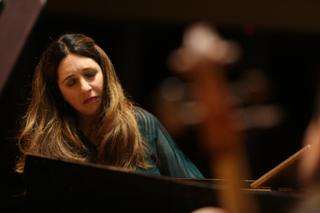|
Back
Duke Performances’ “The Show Must Go Online!”
02/06/2021

S. Dinnerstein (© Tanya Braganti)
Working from home, pianist Simone Dinnerstein performed online a varied program of Bach, Glass, Schumann, and Couperin on January 30. The concert was filmed in Dinnerstein’s Brooklyn residence as part of Duke University’s Duke Performances series, “The Show Must Go Online!”, which will feature a film of an additional recital by the artist to be presented on February 12.
Dinnerstein is one of the most exciting pianistic voices on the contemporary stage. She leads the listener on a serendipitous journey through works we may have thought we knew and works we might otherwise not have considered. Yet, she does not shock for the sake of novelty. I can honestly state that I raised an eyebrow or two over some of the tonal trajectories in the more traditional part of her program in this recital, but I was invariably more delighted than dismayed.
The artist sent chills down my spine from the very first note of the Busoni-Bach Ich Ruf Zu Dir (“I Rest in Thee”). There are a few almost unnoticeable holds here, an infinitesimally dark note in the bass there, that cause one’s breath to catch, almost as though encountering a beatific vision in this most spiritually measured of airs. This sense of tenderness and subdued majesty lingers through the next set, Three Chorales (arranged by Richard Danielpour). Numerous times, something you think is going to be a mistake turns out to be a safety net, and what is Bach if not that?
Dinnerstein moves directly into Couperin’s Les Baricades Mistérieuses, as rococo and urbane as Bach is transcendent: a dark, silky journey through terra incognita. With no need to pause for applause, Dinnerstein breaks boldly into a light and delicate—but not too delicate—burst of Robert Schumann, the Arabesque in C Major, Op. 18. After starting off in a dashing Romantic spirit, it is not long before Dinnerstein challenges us to expand the way we think about this familiar selection, emphasizing colors and patterns we may have missed. Her playing in the two sections labeled Minore I and Minore II changes the mood dramatically, with the latter almost comedic in its exaggerated skipping rhythm. The main theme struggles, as though bogged down in a tar-pit of sound, but happily wins release. Schumann’s music has never sounded more modern. Then, ah, the coda, the Etwas langsamer, (somewhat slower) with a sly little tremble in C# in the bass, sweeping up to A and drifting away to finality. It sends a shiver to the soul.
Schumann leads directly to Philip Glass’s Mad Rush. Dinnerstein plays quite a bit of this contemporary composer, including three selections in her album, “A Character of Quiet”, released last fall. Glass and Dinnerstein have unique, readily identified sounds, but it is not the same sound. This makes for some edgy creative tension leading to music that can’t be second-guessed. The silvery serene opening does not prepare us for the Sturm und Drang of several sections of controlled chaos in which Dinnerstein’s virtuosity is unleashed. Here we witness her depth in the midst of energetic ferocity, quite an unusual interplay of forces.
To end the program, Dinnerstein returns to Couperin, this time the Tic-Toc-Choc, a bit of whimsy with a sinister cast. How those fingers fly! This is an artist who speaks her own truth and wields technical mastery, not for personal display, but to expand our understanding and delight.
Dinnerstein’s recital was On Demand for 72 hours and will be streamed throughout the Durham public school system in the next few weeks. Her second recital film in this series will be presented February 12 co-presented by the Meany Center for the Performing Arts at the University of Washington.
Linda Holt
|